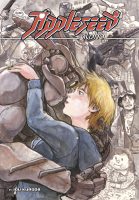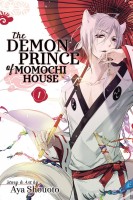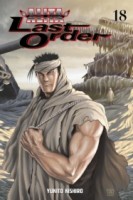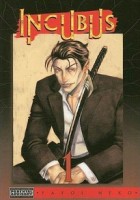My News and Reviews
Last week at Experiments in Manga I announced the winner of the Assassin’s Creed manga giveaway. The post also includes a list of manga published in English that feature pirates of various types, including historical pirates, fantasy pirates, space pirates, and others. Then New York Comic Con (which is still going on) and Yaoi Con were held last week as well. I didn’t attend either event, but there were some announcements made by Kodansha Comics, Viz Media, and SuBLime Manga (which is technically Viz Media, too). Kodansha revealed plans to release Kenji Inoue and Kimitake Yoshioka’s Grand Blue Dreaming, Mitsurou Kubo’s Again!!, and Akiko Higashimura’s Tokyo Tarareba Girls in print. Among other things, Viz will be adding Hidenori Kusaka and Satoshi Yamamoto’s Pokémon Sun & Moon and Tenya Yabuno’s Pokémon Horizon: Sun & Moon and will be re-releasing Naoki Urasawa’s 20th Century Boys and 21st Century Boys in a hardcover edition in addition to speeding up the release of Kōhei Horikoshi’s My Hero Academia. SuBLime announced a few new digital titles, but Ranmaru Zariya’s Coyote and Ogeretsu Tanaka’s Escape Journey will receive print runs, too.
Quick Takes
 Aho-Girl, Volume 1 by Hiroyuki. I only realized it after I finished the first volume of Ah0-Girl, but I’ve actually read another of Hiroyuki’s four-panel manga, Dojin Work, which was never released in its entirety in English. It’s been a long while since I’ve read Dojin Work, but I get the sense that in general I prefer that earlier series over this more recent one. Aho-Girl, while it did legitimately make me laugh on multiple occasions, tends to rub me the wrong way and I personally could have done without all of the sexual harassment being used as the basis for comedy. The dirty jokes I don’t particularly mind, though. As defined by first volume’s cover, “aho-girl” is Japanese for a clueless girl. Yoshiko Hanabatake, the series’ titular character, is indeed an astonishingly dense airhead. Oh, and she really, really likes bananas. Other major characters in the first volume of the manga include Akuru Akutsu, her long-suffering next door neighbor and supposed childhood friend (who doesn’t seem to have many friends in part due to his own unfortunate personality), her mother Yoshie, who would like nothing more than to see the two of the together, and Sayaka Sumino, a genuinely kind girl, classmate, and friend. As may safely be assumed, most of the humor of Aho-Girl revolves around Yoshiko’s sheer stupidity, for better and for worse.
Aho-Girl, Volume 1 by Hiroyuki. I only realized it after I finished the first volume of Ah0-Girl, but I’ve actually read another of Hiroyuki’s four-panel manga, Dojin Work, which was never released in its entirety in English. It’s been a long while since I’ve read Dojin Work, but I get the sense that in general I prefer that earlier series over this more recent one. Aho-Girl, while it did legitimately make me laugh on multiple occasions, tends to rub me the wrong way and I personally could have done without all of the sexual harassment being used as the basis for comedy. The dirty jokes I don’t particularly mind, though. As defined by first volume’s cover, “aho-girl” is Japanese for a clueless girl. Yoshiko Hanabatake, the series’ titular character, is indeed an astonishingly dense airhead. Oh, and she really, really likes bananas. Other major characters in the first volume of the manga include Akuru Akutsu, her long-suffering next door neighbor and supposed childhood friend (who doesn’t seem to have many friends in part due to his own unfortunate personality), her mother Yoshie, who would like nothing more than to see the two of the together, and Sayaka Sumino, a genuinely kind girl, classmate, and friend. As may safely be assumed, most of the humor of Aho-Girl revolves around Yoshiko’s sheer stupidity, for better and for worse.
 Appleseed Alpha by Iou Kuroda. An adaptation of sorts of the Appleseed Alpha anime, which itself is a spinoff of sorts of Masamune Shirow’s Appleseed manga, Kuroda’s Appleseed Alpha manga forms a prequel to the original story. Although to be completely honest, I’m not entirely sure exactly how the Appleseed Alpha fits into the larger Appleseed franchise since I’m not familiar with any of the other manga or anime. What drew me to the Appleseed Alpha manga was Kuroda’s involvement. It’s been a few years since I’ve read it, but I remember enjoying Kuroda’s alternative manga Sexy Voice and Robo, so I was glad to see more of the creator’s work with its distinctive illustration style released. Kuroda’s Appleseed Alpha was longer than I originally thought it was–Kodansha Comics’ hardcover edition is in fact an omnibus collecting the entire two-volume series, but somehow manages to look much shorter than it actually is. Appleseed Alpha is not a quick read although the plot and action moves at a fairly steady pace. The story follows Deunan, a very competent ex-SWAT officer, and her combat cyborg boyfriend Briareos as the couple makes their way through a dystopic cyberpunk Western version of the United States. Previous knowledge of Appleseed is not needed to enjoy Kuroda’s somewhat quirky contribution.
Appleseed Alpha by Iou Kuroda. An adaptation of sorts of the Appleseed Alpha anime, which itself is a spinoff of sorts of Masamune Shirow’s Appleseed manga, Kuroda’s Appleseed Alpha manga forms a prequel to the original story. Although to be completely honest, I’m not entirely sure exactly how the Appleseed Alpha fits into the larger Appleseed franchise since I’m not familiar with any of the other manga or anime. What drew me to the Appleseed Alpha manga was Kuroda’s involvement. It’s been a few years since I’ve read it, but I remember enjoying Kuroda’s alternative manga Sexy Voice and Robo, so I was glad to see more of the creator’s work with its distinctive illustration style released. Kuroda’s Appleseed Alpha was longer than I originally thought it was–Kodansha Comics’ hardcover edition is in fact an omnibus collecting the entire two-volume series, but somehow manages to look much shorter than it actually is. Appleseed Alpha is not a quick read although the plot and action moves at a fairly steady pace. The story follows Deunan, a very competent ex-SWAT officer, and her combat cyborg boyfriend Briareos as the couple makes their way through a dystopic cyberpunk Western version of the United States. Previous knowledge of Appleseed is not needed to enjoy Kuroda’s somewhat quirky contribution.
 QQ Sweeper, Volumes 1-3 by Kyousuke Motomi. I greatly enjoyed Motomi’s earlier manga series Dengeki Daisy, so I was looking forward to giving another of the creator’s series a try, which is what ultimately led me to QQ Sweeper. (A few of the characters from Dengeki Daisy actually happen to make quick cameo appearances in the series, too.) Fumi’s dream in life is to find a prince charming to sweep her off her feet. Instead, she finds Kyutaro who has a fixation on literally sweeping. He has a pretty good reason for it, though. Kyutaro and his family are responsible for ridding the local area of dangerous infestations of malicious thoughts and psychological torment which manifest as bugs and physical cleanliness can go far to help with spiritual cleanliness. Of course, sometimes the bugs really are just bugs. For as seemingly silly and charmingly goofy as QQ Sweeper can often be–it can essentially be summed up as a supernatural cleaning manga–the series quickly becomes surprisingly dark. QQ Sweeper ends somewhat suddenly with the third volume and doesn’t really provide much of a satisfying conclusion, but fortunately the sequel series Queen’s Quality has been licensed as well. The series’ humor and seriousness occasionally seems a little off-balance, but I really liked QQ Sweeper and certainly plan on continuing with the story.
QQ Sweeper, Volumes 1-3 by Kyousuke Motomi. I greatly enjoyed Motomi’s earlier manga series Dengeki Daisy, so I was looking forward to giving another of the creator’s series a try, which is what ultimately led me to QQ Sweeper. (A few of the characters from Dengeki Daisy actually happen to make quick cameo appearances in the series, too.) Fumi’s dream in life is to find a prince charming to sweep her off her feet. Instead, she finds Kyutaro who has a fixation on literally sweeping. He has a pretty good reason for it, though. Kyutaro and his family are responsible for ridding the local area of dangerous infestations of malicious thoughts and psychological torment which manifest as bugs and physical cleanliness can go far to help with spiritual cleanliness. Of course, sometimes the bugs really are just bugs. For as seemingly silly and charmingly goofy as QQ Sweeper can often be–it can essentially be summed up as a supernatural cleaning manga–the series quickly becomes surprisingly dark. QQ Sweeper ends somewhat suddenly with the third volume and doesn’t really provide much of a satisfying conclusion, but fortunately the sequel series Queen’s Quality has been licensed as well. The series’ humor and seriousness occasionally seems a little off-balance, but I really liked QQ Sweeper and certainly plan on continuing with the story.















